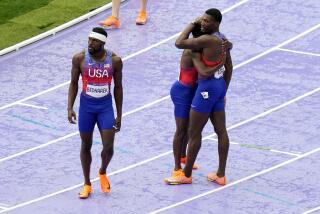Lewis Beings Another Olympic Quest This Week
- Share via
ATLANTA — Carl Lewis, an eight-time gold medalist and perhaps the greatest sprinter of all time, couldn’t even qualify for the Olympics at 100 or 200 meters four years ago.
A virus had sapped his strength, and he failed to finish among the leaders in those events at the U.S. Olympic trials. Despite winning the previous two gold medals in the 100, he was barely more than an onlooker at Barcelona.
He won the long jump and a relay gold at the 1992 Olympics, but his decade of sprint domination was over. Many thought he was too old to compete, a conclusion that gained wider acceptance with his poor performances last year and this winter.
Now, a few weeks short of his 35th birthday, Lewis is back for another shot. And he’s once again a top contender for spots in the 100, 200 and long jump when the 10-day Olympic trials open Friday.
A wind-aided time of 9.94 seconds in the 100 at the Atlanta Grand Prix in May, on the same track that will host the Olympic trials and the Summer Games, put Lewis back among the favorites to make the U.S. team.
“They haven’t put me on the team. They haven’t made me a medal favorite. They haven’t done anything,” Lewis said of his spring times. “But what they’ve done is restore my greatest asset, and that is my confidence. My confidence is back supreme again. I feel I can beat anybody in any race.”
Only the top three finishers in each race at the Olympic trials will make the U.S. squad. That means some of the top runners in the world will not even make it to the Olympics.
To illustrate just how hard it will be to make the U.S. team, consider this: The qualifying time for the Olympics in the men’s 100 is 10.34, while the qualifying time for the U.S. trials is a much tougher 10.20.
In the 100, the field facing Lewis will include world record holder Leroy Burrell, 1992 Olympic bronze medalist Dennis Mitchell, 1993 world championship silver medalist Andre Cason, and Mike Marsh, the 1992 Olympic 200-meter champion.
At least two of the five speedsters won’t even make the U.S. team.
Burrell, who set the world mark of 9.85 seconds in 1994, is in greatest danger of getting squeezed out. Coming off two years of injuries, he just qualified for the Olympic trials last week at the Jenner Classic.
More to Read
Go beyond the scoreboard
Get the latest on L.A.'s teams in the daily Sports Report newsletter.
You may occasionally receive promotional content from the Los Angeles Times.






